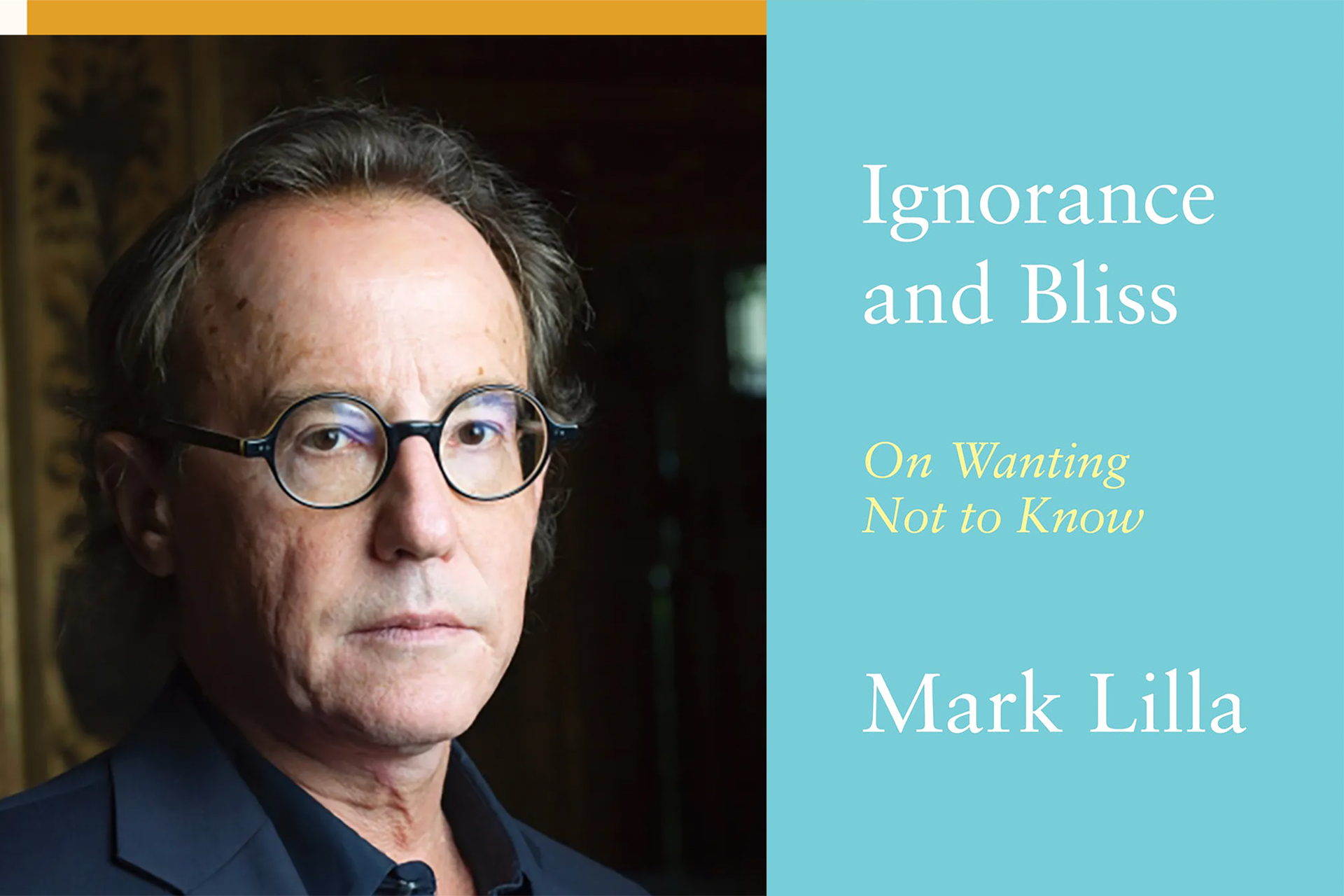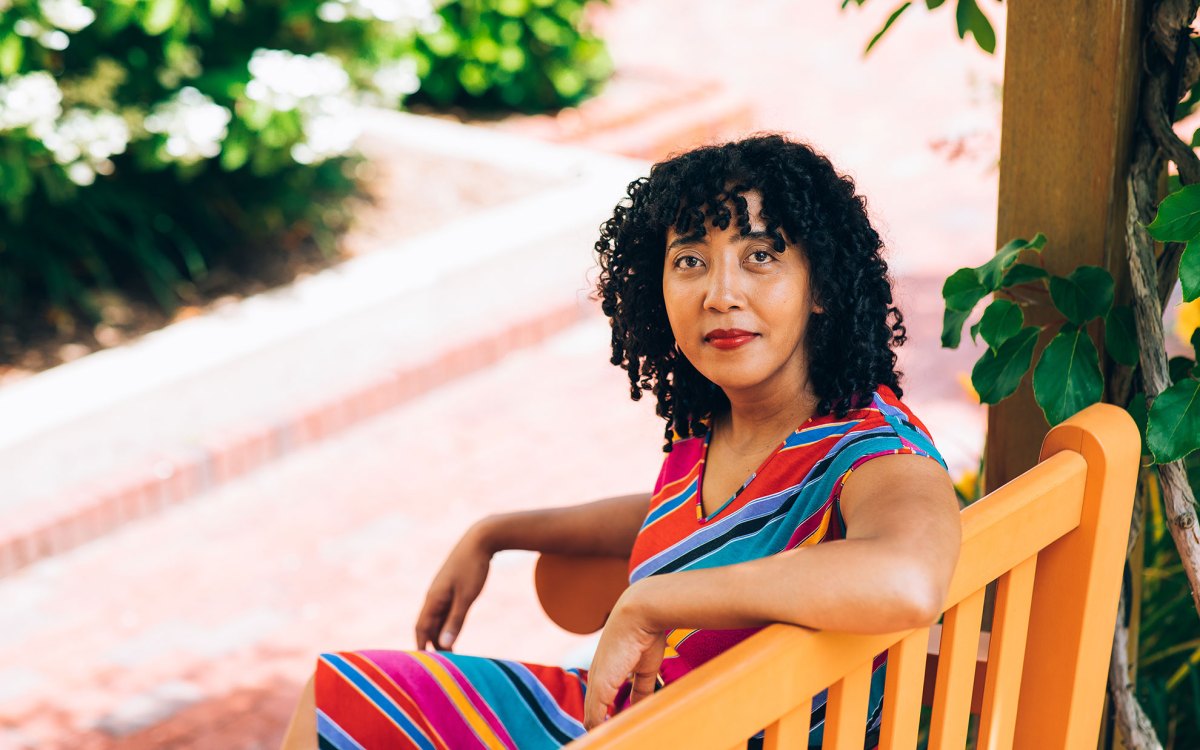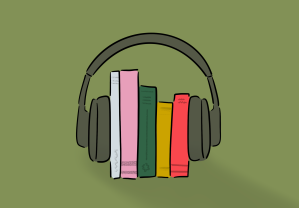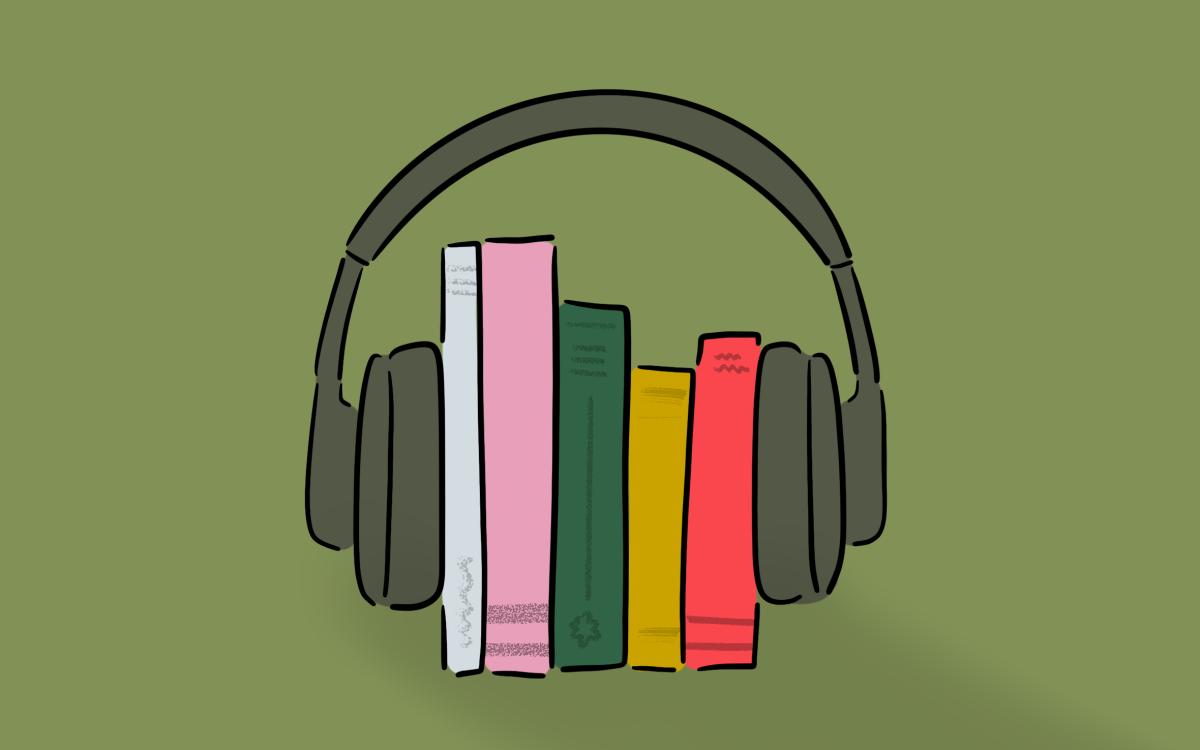
© Christophe Delory
Welcome to age of the will to ignorance
Political scientist, historian examines why so many embrace ‘magical thinking that crowds out common sense and expertise’ in new book
Excerpted from “Ignorance and Bliss: On Wanting Not to Know” by Mark Lilla, M.P.P ’80, Ph.D. 1990, which was published in December by Farrar, Straus and Giroux.
The faintest of all human passions is the love of truth.
— A. E. Housman
There was a man who lived in a cave. He did not know that’s where he lived, because his legs had been chained to the ground and his head was enveloped by a device that projected a virtual life not his own. One day an unknown woman removed the device and unlocked the chains, and he saw for the first time where he and many others actually were. He was shattered. The woman comforted him as best she could and said she was there to take him away. As he was preparing to leave, the man noticed a young boy who had been sitting next to him, his legs also bound, his small head invisible inside the grotesque machine. Out of pity he asked the woman if he could take the boy along. She agreed, and they departed.
The climb out of the cave was difficult. When they emerged, the man and boy found themselves in a light so intense that at first they could hardly open their eyes. Little by little, as their vision adjusted, they began to see vague forms illuminated by the sun. These forms, though difficult to describe, were somehow pleasing. The woman called them Ideas and explained that they, and only they, “truly are,” and that all else is illusion. Neither the man nor the boy understood what she was saying, but they found it, too, somehow pleasing. The woman left and did not return for several years.
When she did, she made a request. Now that the man had been freed and lived happily in the light, would he be willing to return to the cave and bring someone else out, just as she had done for him? He agreed and said he would take the boy down with him. But the next morning, after thinking back on the hardships of the first journey, he decided to go alone. He could do the work himself, so why make the boy suffer and deprive him of time in the sun? He called the boy over and announced the good news: he would be staying behind.
The boy began to weep, softly at first, then in earnest. The man was touched by his devotion but told him he should remain in paradise. The boy then fell to his knees and grabbed the man’s cloak, pleading, No, no, you must take me back! I can’t live here any longer. I hate it. The man was stunned. He asked what was wrong, and the boy began to pour out his grievances between sobs:
I’m always cold here. The light is bright, but generates no heat. It reveals everything to my eyes, but doesn’t warm my body. It is so strong that all the colors are washed away; the Ideas are like bleached skeletons, like death. I miss shadows, the night sky, the stars, even if they were illusions.
I can’t sleep. Back in the cave I would sometimes dream at night of things I’d never seen, imagining myself in unknown places doing unexpected things. Now I no longer dream. I know too much. I know what is and that nothing else can ever be real. Isn’t that terrible? How can you stand it?
I’m sad all the time. And I miss my playmates, even if they were just pixels on a screen. Here, no one plays or pretends or even tells a joke. What would be the point? You don’t love me, I don’t love you: we know too much even for that. I want to go home.
And so he did
Just as we can develop a love of truth that stirs us within, so we can develop a hatred of truth that fills us with a passionate sense of purpose.
Aristotle taught that all human beings want to know. Our own experience teaches us that all human beings also want not to know, sometimes fiercely so. This has always been true, but there are certain historical periods — we are living in one — when the denial of evident truths seems to be gaining the upper hand, as if some psychological bacillus were spreading by unknown means, the antidote suddenly powerless. Mesmerized crowds follow preposterous prophets, irrational rumors trigger fanatical acts, and magical thinking crowds out common sense and expertise.
One can always find proximate causes of such surges in resistance to truth, whether historical events or social changes or new intellectual and religious currents promising a holiday from reality. The source lies deeper, though, in ourselves and in the world itself, which takes no heed of our wishes.
The world is a recalcitrant place, and there are things about it we would prefer not to have to recognize. Some are uncomfortable truths about ourselves; those are the hardest to accept. Others are truths about outer reality that, once revealed, steal from us beliefs and feelings that have somehow made our lives better, easier to live — or so we think. The experience of disenchantment is as painful as it is common, and it is not surprising that a verse from an otherwise forgotten English poem became a common proverb: Ignorance is bliss.
We can all come up with reasons why we and others avoid knowing particular things, and many of those reasons are perfectly rational. A trapeze artist, just before climbing the pole, would be unwise to consult the actuarial table for those in her line of work; a young poet should pass up the chance of asking an older one what she thinks of his verses. Even the question Do you love me? should not trip off our tongues, but rather pass through several checkpoints before being uttered. If we knew what every person thought of us at every moment (imagine a small LED screen embedded in every forehead, relaying every thought), we would not only feel paralyzed before them; we would also have trouble attaining any independent sense of ourselves, free from the opinions of others. Even self-knowledge, the beginning of wisdom, depends on resisting at least this kind of knowledge about the world.
So in particular cases we all have instrumental reasons for avoiding the truth, the whole truth, and nothing but the truth. Our lives, though, are not made up of a string of discrete, unrelated moments in which we decide to seek knowledge about one thing, then decide not to seek it about another. Life is not an assembly-line job where we are tasked with sorting experiences into one box or another — want to know, don’t want to know — as they chug down the conveyor belt. We all have a basic disposition toward knowing, a way of carrying ourselves in the world as experiences come our way. Some people just are naturally curious about how things got to be the way they are; they like puzzles, they like to search things out, they enjoy learning why. Others are indifferent to learning and see no particular advantage to asking questions that seem unnecessary for just carrying on. And then there are people who, for whatever reason, have developed a particular antipathy toward the search for knowledge, whose inner doors are fastened tight against anything that might cast doubt on what they believe they already know. We have all met people with these basic attitudes. Most of us have also fallen into moods where they emerge in ourselves, however uncharacteristically.
Knowing is an emotional experience. It is not simply a matter of the senses sending messages to the brain, synapses firing, propositions being formed and their logic tested. The desire to know is exactly that, a desire. And whenever our desires are satisfied or thwarted, our feelings are engaged. Even in trivial matters, we feel something about what we learn. Say, for example, a toaster I own breaks and needs to be fixed. I look at the manual, I watch videos, I ask questions, I tinker, and with any luck I learn how to make it work again. I feel satisfied, and doubly so. Not only can I use the machine again, I have also confirmed my sense of being the kind of person who can seek knowledge, find it, and use it. Toast and self-satisfaction: not a bad way to start the day.
But there is also the contrary disposition: the will not to know, the will to ignorance.
Socrates asserted that the unexamined life is not worth living for a human being — from which it does not follow that the relentlessly examined life is.
It was Nietzsche who coined the term, and his description of being in its grip is unforgettable. Opposed to the drive to knowledge, he wrote, is:
an apparently opposite drive, a suddenly erupting decision in favor of ignorance, of deliberate exclusion, a shutting of one’s windows, an internal No to this or that, a refusal to let things approach, a kind of state of defense against much that is knowable, a satisfaction with the dark, with the limiting horizon, a Yea and Amen to ignorance.”
Nietzsche was a hyperbolic thinker and writer, but in this case he was exaggerating nothing. There are people whose disposition toward seeking knowledge can grow weaker or stronger depending on their mood or circumstances. And then there are those whose basic psychological posture, so to speak, is to resist new knowledge. Just as we can develop a love of truth that stirs us within, so we can develop a hatred of truth that fills us with a passionate sense of purpose. If that seems an alien notion, consider this passage from Pascal’s “Pensées” and ask yourself if it doesn’t capture a feeling that has welled up within you at some point, or if it is an attitude you have observed in others:
The self wants to be great, and sees itself small; it wants to be happy, and sees itself wretched; wants to be perfect, and sees itself full of imperfections; it wants to be the object of men’s love and esteem, and it sees that its defects deserve only their dislike and contempt. This embarrassment in which it finds itself produces in it the most unrighteous and criminal passion imaginable, for it conceives a mortal hatred against this truth, admonishing it and convincing it of its faults. It wants to annihilate this truth, but, unable to destroy it in its essence, it destroys it as far as possible in its own knowledge and in that of others.
Resisting knowledge is an emotional experience, too.
Living in the shadow of the modern Enlightenment, we are accustomed to hearing curiosity extolled for the material benefits it brings and for the contribution it makes to what we today consider our most precious possession: inner freedom. For just that reason, perhaps, we are less accustomed to observing and reflecting on curiosity as a purely psychological drive charged with unruly passions. There is of course a long tradition of thinking that looks askance at the human passion for knowing and raises doubts about its value for life. Reasons can be given for the desire to know; reasons also can be given for constraining that desire.
But apart from this clash of reasons there is also a clash of unreasoning emotions, with the desire to defend and even cultivate our ignorance standing as a powerful adversary to the desire to escape it. Once one learns to recognize this clash of wills, one begins to see what an important role it plays in our individual and collective lives, and especially in how we think about those lives. As George Eliot put it: It is a common sentence that Knowledge is power; but who hath duly considered or set forth the power of Ignorance?
In my experience, the deepest treatments of the will to ignorance are to be found in works of the Imagination — ancient myths, religious scriptures, epic poetry, plays, and modern novels. This should probably come as no surprise: without the capacity to resist seeing what is right before our eyes, there would be no drama in human life, no movement. A story about someone who discovers that a truth has been kept from him by someone else reveals nothing particularly interesting about what it is to be human (except that some people are liars). A story about someone who has kept the truth from himself immediately becomes a work as complex as any watch, with innumerable gears and springs that labor just below the surface of a deceptively lethargic face.
In exposing the ruses of the will to ignorance, literature exposes us to ourselves, which is sufficient for its purposes. What we lack — or at least what I found lacking for my own purposes — is a nonpoetic reflection on the will to ignorance and its polymorphous role in human existence. How is it that we are creatures who want to know and not to know? How is it possible for both desires to inhabit the mind? What function does resistance to knowledge serve in shaping our emotions, our self-understanding, and our understanding of the world around us? How has it influenced our common life, our religions, and our cultures? And what does it mean for how we should live? Socrates asserted that the unexamined life is not worth living for a human being — from which it does not follow that the relentlessly examined life is. Where does that leave us? These are some of the questions I propose to explore.
Throughout it will be good here to return to the story I began with, a parody of Plato’s “Allegory of the Cave.” The little boy does know what knowing is like — and that is why he wants to escape. His is a knowing will to ignorance. I imagine him first emerging from the cave baffled and a little scared, but, like all youngsters, intrigued by a new place to explore. I imagine him looking at the Ideas and sometimes enjoying the feeling of having understood. And yet he snaps. The world as it truly is does not welcome him; it looms, oppressively. The price of living this way is too high. He wants to flee and forget what he already knows. He wants a different kind of life from the one that has been thrust upon him. Plato spoke of the eros of intellect; the young man is in the grip of the thanatos of intellect. If we do not understand both, we do not understand ourselves.
We want to know, we want not to know. We accept truth, we resist truth. Back and forth the mind shuttles, playing badminton with itself. But it doesn’t feel like a game. It feels as if our lives are at stake.
And they are.




